Let’s reclaim the power of language
To help people embrace the future will take poetry, not platitudes.

Words — so innocent and powerless as they are, standing in a dictionary, how potent for good and evil they become in the hands of one who knows how to combine them.
— Nathaniel Hawthorne, American novelist
When Amanda Gorman stepped forward to read ‘The Hill We Climb’ at US President Joe Biden’s inauguration in January 2021, her book sales rocketed overnight. Gorman’s poem expressed yearning, fatigue, grief, rage, pride, wonder and hope for a polarised nation, sentiments that resonated far beyond American shores.
We will not march back to what was, but move to what shall be:/ A country that is bruised but whole, benevolent but bold, fierce and free.
Her call to action was a reminder of the transcendent power of language. It captured the bittersweet spirit of the zeitgeist in a way few contemporary leaders seem able to manage.’
Such mastery provides momentary relief from the relentless erosion of language and meaning across politics, business and society in recent years.
‘We have lost the lyric of Creation,’ says Australian poet and essayist Mark Tredinnick. ‘We have told ourselves stories. They’re not great stories; they’re tired plots.’
Good words have been bludgeoned, corporatised, weaponised and gutted of substance. Many of us have been complicit in this process, worn down; others cynically detached. This linguistic hollowing-out coincided with the growing use of new technologies, rapid globalisation, political brinkmanship and social fragmentation to produce a perfect storm.
We now suffer from a collective inability to communicate meaningfully with each other on things that matter. Moreover, scientific research shows words resonate at a cellular level and how we use them literally shapes how we think, feel and behave — toward ourselves and to each other.
As psychoanalyst Sigmund Freud noted: ‘Words have a magical power. They can either bring the greatest happiness or the deepest despair’.
Which path do you choose?
What this orthodox organisation leaves out of account, when it comes to understanding institutions, is that we are not dealing with pistons, pumps, and distributor arms, but with people; and the connections between the parts are not crankshafts, pipes, and electrical wires but human relationships.
— Stafford Beer, Designing Freedom (1973)
Like a boiling frog, the dehumanisation of language hasn’t happened overnight. Some trace the current decline back to 1909 when Frederick Winslow Taylor published his principles of scientific management. Taylor decoupled humanity from the act of work and instilled the machine as the dominant metaphor for organisations and industry. As Taylor argued, ‘In the past man has been first; in the future the system must be first’.
Over the century since Taylor published those principles, other trends have moved in and out of vogue, all serving to stifle the elegant tango of language and meaning.
Outside academe, media and the arts, these shifts seem largely unnoticed and unchallenged. However, they matter because of how they warp public discourse through an underlying set of assumptions around, for example, economic growth, how work is organised, equality and notions of success.
War and military metaphors persist: think of terms like strategy, tactics, campaigns, guerrilla marketing, price wars, frontline troops, taking (no) prisoners and, of course, the war for talent.
In many industries, moonshots are now de rigeur. Markets suffer carnage and routs; even in disciplines like biology and medicine, aggressive terms describe diseases and chart the impact of invasive species.
Sport has infiltrated organisational life with its focus on high-performance teams, full court presses, bench strength, being down for the count and dropping the ball, not to mention pivots.
Politics, the arts, even community organisations have been swept up too, ideologies, orthodoxies and naïve ignorance creating a treacherous swamp for thoughtful leaders to navigate.
This was familiar territory to writer and essayist George Orwell, who warned in 1946 that ‘the great enemy of clear language is insincerity. When there is a gap between one’s real and one’s declared aims, one turns as it were instinctively to long words and exhausted idioms, like a cuttlefish spurting out ink’.
In that vein, the long tail of neo-liberalism continues to dominate business and infect other sectors with weasel words like bandwidth, value add, low-hanging fruit, rightsizing, best practice and synergies.
More recently the information technology industry, growing like one of those invasive species with no known predators, instructs us to break things, circle back, move forward, lean in and fail fast, what Silicon Valley refugee and author Anna Wiener calls ‘garbage language’.
Worthy movements like climate action inadvertently launched a wave of corporate ‘green-washing’, succeeded by ‘purpose-washing’ and eye-watering investment in rebranding, culture change and mission statements as organisations chase a more sceptical generation of young workers.
In recent times, different strains of semantic root-rot have converged in spectacular fashion. Everybody is an entrepreneur; if they’re not, they’re a social entrepreneur building a purpose-driven business that’s sure to fail fast, often courtesy of a public or philanthropic handout.
In this era of global scaling, small businesses, long the backbone of many economies, barely rate a mention.
Western governments have openly struggled with the corporatisation model and how such language and practice aligns with government’s role in the 21st century. Management consultants have added to the confusion with more jargon and, sniffing the wind, have pledged to make governments both efficient and more collaborative.
They call that a ‘win-win’.
As workers despaired at the frenzied nature of this brave new world, technology platforms spawned the gig economy and with it, unprecedented opportunities to pursue the work life of your dreams or be egregiously exploited.
Across the world, trust levels crashed and innovation and productivity stagnated as people turned off to preserve what was left of their sanity and dignity.
Then COVID-19 happened, and the fracturing of work and society went on public display as leaders scurried to find new ways to pivot.
The limits of my language mean the limits of my world.
— Ludwig Wittgenstein, philosopher
This, then, is a call to wrest back language and rekindle our belief in the collective and the lyricism of life.
‘Language can open us up to the world and open the world up to us,’ says essayist Bernadette Brennan, ‘but degraded language entraps us, it stifles our imaginative openness.’
A global pandemic has ripped aside the curtain of obfuscation and revealed how life really is, creating an opportunity to claim what we want for ourselves and for those around us. To have this conversation, to imagine an alternative to banality and exclusion, we need courage and honest words.
‘Be kind. Tell the truth. Don’t be afraid,’ Nobel Laureate Seamus Heaney advised.
We need decision-makers to shrug off decades of conditioning and heed our call for a different kind of world: kinder, more humane.
In the face of this existential crisis, words are a potent tool. We shape our world through the language we use, lose or choose to endure. There’s irony in the fact that poetry and other forms of creative expression, often belittled as indulgences, helped many of us survive lockdown. In fact, to rediscover our true selves.
For Mark Tredinnick, poetry — all of literature — ‘may be a trick humanity evolved to keep us sane.
‘Think of a poem as a place. Enter it. Be changed./Think of a poem as a hearth. Sit by it, and be warmed./Think of a poem as a choir. Singing one voice it sings us all.’

Josie Gibson
Interested in leadership, big change and how to create a better world